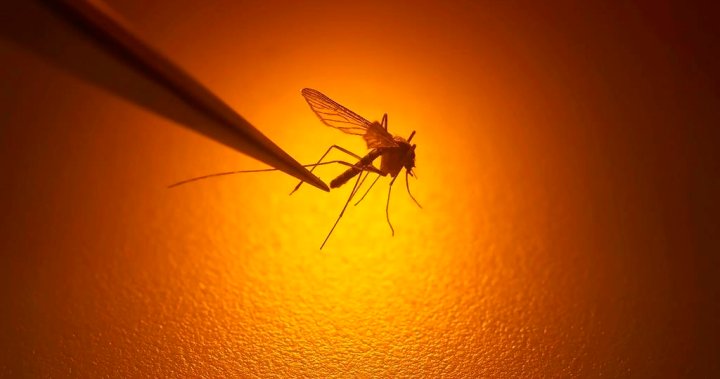With record-breaking heat waves and warmer summers, there are growing concerns from public health officials and those who study insects that insect-borne viruses and diseases normally not seen in Canada could become more commonplace.
Fiona Hunter, a professor of medical and veterinary entomology — the study of insects — told Global News that while cases of Zika virus or dengue fever often are seen in “exotic” locations, that could change.
“All it takes really is to have a population of competent mosquitoes in a place and have somebody who’s travelled and then picked up one of these viruses, comes home, gets bitten by the local mosquitoes and those local mosquitoes bite their neighbours,” Hunter said.
Zika and dengue are commonly found in tropical regions like the western Pacific, parts of Africa and South America.
The Public Health Agency of Canada (PHAC) notes the mosquitoes that transmit Zika are not established in the country due to climate, while dengue is namely seen through imported cases ranging from 200 to 300 annually.
Canada’s species also can’t transmit or be infected with dengue, needing a local population of the Asian tiger mosquito that carries it, and though there’s a small group in Windsor, Ont., transmission likelihood is low.
But while Canada’s climate has kept these insects from spreading across more areas of the country in the past, Sebastien Chouinard with Environment and Climate Change Canada noted on Wednesday that temperatures are rising.
“August saw higher than normal temperatures in most of the country,” Chouinard, director of the department’s meteorological team, said in a federal wildfire and hurricane update. “Over the past decade we have seen higher temperatures and this is because of climate change.”
Dr. Nick Ogden with PHAC’s National Microbiology Lab said given the emergence of mosquito-borne and other insect-borne diseases is being driven by climate change, there is a “very theoretical risk” that these viruses and diseases could be locally acquired in Canada.
Get daily National news
Get the day’s top news, political, economic, and current affairs headlines, delivered to your inbox once a day.
“We are exploring the possibility that they may be a little bit more widespread than we know at the moment and certainly during some periods of the summer and for this summer, it’s hot enough to allow transmission…. That gives the possibility that someone who returns from travel, who’s infected with one of the viruses might be able to transmit the infection to somebody who has not travelled.”
He added that climate change could drive a “more epidemic behaviour” of mosquito-borne diseases — meaning one year may see a larger number of cases than the year prior.
Recent analysis by ECCC has said human-caused climate change made recent heat waves at least two to 10 times more likely to have occurred.
A heat wave that impacted Atlantic Canada in mid-June saw peak average temperatures hit 26.1 C, about 10.6 C above normal. And in mid-July, Alberta saw a peak temperature of 31.5 C, a total of 9.8 C above average.
The Copernicus Climate Change Service, which publishes monthly climate bulletins on global surface air and sea temperatures, also found that multiple countries were seeing above-average temperatures this summer, including Mexico, China and Canada.
U.S., Europe see locally transmitted cases of dengue
Locally transmitted cases of viruses like dengue are being seen in places that haven’t had as many cases, like parts of the U.S. and, most recently, Europe.
The European Centre for Disease Control and Prevention reported an increase in locally acquired cases in June in at least 13 countries, with its principal expert in emerging and vector-borne diseases stating environmental conditions in Europe have “become suitable for virus transmission.”
In the U.S., the number of cases of dengue has already hit 5,027, more than the 3,300 in 2023. Locally acquired cases have doubled, with 3,277 reported this year compared with just 1,462 for the entirety of 2023.
Locally acquired cases of Zika spiked in 2016 during a global outbreak, with more than 30,000 reported in the U.S. That number has dropped to less than 20 in both countries in recent years, but the risk is still there.
Infectious diseases physician Dr. David Fisman says with insects spreading to new locations and temperatures rising, humans are getting bitten earlier and at risk sooner than before.
“There’s a longer time for them to be collateral damage with the mosquitoes,” he said.
Ogden and Hunter point to ticks as an example of a disease-carrying insect that, while not from a tropical region, has spread due to climate change.
“If we go back to the mid-2000s, we knew of sites in Ontario that you could find black-legged ticks, (but) you have to really look for them,” Hunter said. “In the last 15-20 years, you can find black-legged ticks virtually anywhere in Ontario now.”
Cases of Lyme disease hit 144 in 2009, but jumped to 992 in 2016, and reached a recorded peak of 3,147 in 2021. According to PHAC, there are more than 800 risk areas for Lyme disease in Canada, stretching from southern B.C. to southern Quebec and much of Nova Scotia.
While the risk remains low that Zika or dengue could spread in Canada, Ogden says officials aren’t taking anything for granted. They’re combining modelling with field studies to produce risk maps, identifying higher-risk times and determining what works to control mosquito populations that carry these viruses based on other countries’ actions so that they can be controlled here in an outbreak.
Hunter added there is a “silver lining” in terms of detecting the potential of these viruses and diseases coming to Canada: the U.S. has significant mosquito surveillance programs.
“We just have to keep a close eye on what’s happening there and we’ll see when we’re likely to get hit,” she said. “I think we can rely on our American neighbours to give us a heads up there.”
© 2024 Global News, a division of Corus Entertainment Inc.
https://globalnews.ca/news/10766772/canada-climate-change-dengue-zika-cases-warmer-summers/


